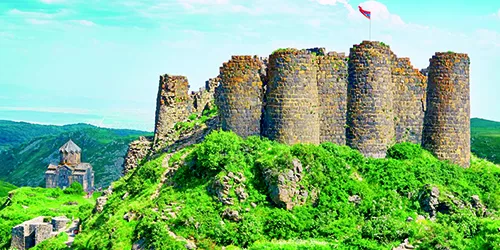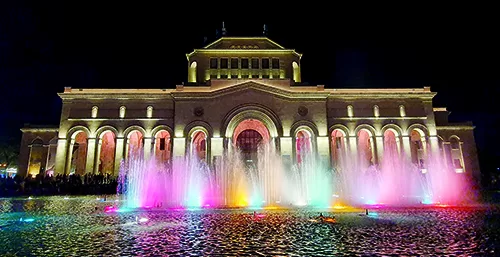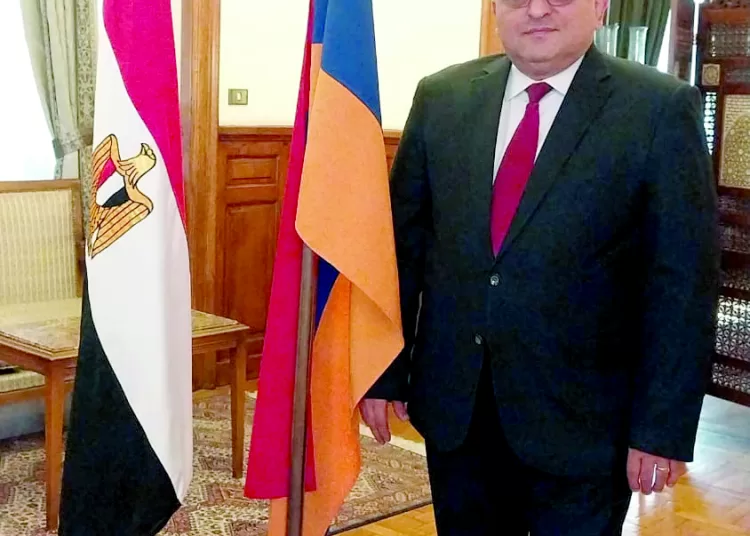This year Armenian people celebrate the 33rd anniversary of Independence of Armenia. 33 years ago, Armenians voted in a referendum saying “YES” to leaving the USSR and establishing an independent, democratic Republic of Armenia. On this historical day, the Armenian nation restored its statehood reclaiming its right to live in freedom, to preserve its identity, culture and traditions and to build its own destiny. Indeed, history has taught us that independence, sovereignty and statehood are the only real guarantors for preserving our national identity and thriving as a nation.
Although both the path to an independent Armenia and the last 33 years of Independence have been very difficult, full of obstacles and hardships, it is unequivocally worth any effort and sacrifice and Armenian people continue they journey towards building a strong, democratic and prosperous state.
Today, the world is witnessing profound geopolitical changes that affect each and every country, are having and can have further negative repercussions not only for individual countries but for the future of all mankind. And every state has its own share of responsibility to contribute to the establishment of an International order that would guarantee peace and stability worldwide and provide conditions for everyone to live, work and thrive in peace and dignity.

International co-operation, in this regard, is the key to a better common future for all, and states, as members of International community, should collaborate having this broad objective in mind. With such a perspective, Armenia has, since independence, attached special importance to the relations with the Arab World. Armenia has established diplomatic relations with all the Arab states (the latest being Saudi Arabia in 2023) and effective co-operation with the League of Arab States. At the moment we have eleven diplomatic missions, including three General Consulates, operating in the region. Indeed, Egypt has always been one of our main partners in the Middle East. Our countries share so many common cultural, moral and ideological values that serve as a basis for our close co-operation bilaterally and in multilateral fora. Our fond ties with Egypt are also based on the centuries-old friendship between our two peoples. The traditional Armenian community of Egypt, with such notorious individuals as the first Prime Minister of Egypt Nubar Pasha, the first Minister for Foreign Affairs Boghos Bey Yusufian, as well as well-known artists like Anoushka, Lebleba, Saroukhan etc, has greatly contributed to the state-building of Egypt and has enriched the cultural scene of the country. And, nowadays, the Armenian community has become one of the bridges that bring our countries and peoples closer to each other. It is not a coincidence that the very first Embassy of Armenia in the Middle Eastern region was opened in Cairo back in 1992, while Egypt was one of the first Arab states to recognise the independence of Armenia and open an Embassy in Yerevan in 1993.
Our bilateral relations have steadily developed throughout these years encompassing more and more spheres of mutually beneficial co-operation. During the last three years, the number of tourists visiting both countries has significantly increased, due the visa facilitation by both countries, and a further increase is expected due to the launch of a direct flight between Yerevan and Cairo since June 2024, which will also lead to the growth of economic and cultural co-operation. I am particularly pleased that, in appreciation of Armenian-Egyptian friendly relations, in April 2023, one of the squares of Yerevan was named “the Square of Egypt” and soon, as announced by the Egyptian side, one of the squares of Cairo will be renamed to the “Square of Armenia”.
The political dialogue between our governments is also on a very high level, especially during the recent years when several high-level mutual visits have taken place. Most importantly, in January 2023, the President of the Arab Republic of Egypt has paid an official visit to Yerevan which was the first ever visit of an Egyptian president to Armenia, while in March 2024, Prime Minister of Armenia Nikol Pashinyan reciprocated by paying his first official visit to Egypt and holding a productive meeting with the President of Egypt.
Overall, evaluating the current state of Armenian-Egyptian relations, I can confidently tell that at the moment our interstate relations are at their highest point, especially in terms of the level of political dialogue between our two governments, and I am proud that, as the Ambassador of Armenia to Egypt during the last 3 years, I have had my humble contribution to the further development of the relations and mutually beneficial co-operation between Armenia and Egypt. And today, as Armenia celebrates the 33rd anniversary of Independence, we are privileged to have Egypt as a reliable partner and friend. Armenia greatly appreciates the sincere friendship of Egypt and highly values the stabilising political role that Egypt plays in maintaining and fostering security and co-operation in the Middle East, Africa and beyond, with its balanced, peace-oriented foreign policy as well as its effective role and experience in countering terrorism and extremism. Egypt’s ongoing tireless efforts aimed at mediating a lasting ceasefire in Gaza and addressing the humanitarian needs of Palestinian people are particularly formidable. I would like to note that Armenia has also joined the calls of International community for an immediate ceasefire in Gaza and demonstrated it commitment to establishing peace and stability in the Middle East by officially recognising the State of Palestine in June 2024 based on its convincement that the “two-state” solution is the only way towards reaching a lasting peace and reconciliation between the Jewish and Palestinian peoples. In March 2024, the Armenian government also sent around 30 tons of humanitarian aid for the people of Gaza, to somehow contribute to the alleviation of the sufferings of Palestinians, since Armenian people know very well the scourge of war and have themselves been going through very difficult times during the recent several years:
While struggling against the repercussions of Covid-19, Armenia faced another disaster: The full-scale military aggression by Azerbaijan in 2020 against the Armenians of Nagorno Karabakh, later on the 10-month long blockade imposed on Nagorno Karabakh, the famine and the ethnic cleansing committed by Baku claimed thousands of lives and led to massive destruction and a humanitarian crisis. Around 120,000 forcibly displaced refugees, the entire indigenous population of the region, were forced to flee to Armenia within days under the threat of persecution and atrocities.

In addition to the above-mentioned, in 2021 and 2022 the Republic of Armenia itself faced large-scale military aggressions and occupation of its sovereign territories by Azerbaijan, that in turn led to internal displacement and gross violations of the rights of people living in the border regions.
Nonetheless, Armenian people persevered in the face of all challenges and managed to defend its independence and sovereignty. Despite all the difficulties, Armenia maintained a steady pace of progress and development. The Armenian government has set forth the main priorities of Armenia’s sustainable development in the strategy of transformation of Armenia until 2050, which is aimed at eradicating poverty, promoting food security, human development and environmentally friendly economic growth.
Important economic reforms, effective fiscal policy and inflation targeting contributed to the steady growth of the economy with up to double-digit GDP and the overall improvement of the socio-economic picture of the country.
We strongly believe that sustainable development can only be achieved on the solid foundation of strong democratic institutions, protection of fundamental human rights, justice and society, and regional and global peace.
And, in this regard, I can state that, since its independence, Armenia has been a responsible member of the International community that respects its international obligations and is committed to upholding international peace and security and bringing its contribution to the peaceful resolution of ongoing conflicts all over the world, starting from our own neighbourhood. This commitment of ours is clearly demonstrated in our vision of establishing peace in the South Caucasus. For this end, Armenia has proposed the “Crossroads of Peace” project, that aims at developing communication between Armenia and neighbouring countries by unblocking regional infrastructures based on the principles of sovereignty of states, jurisdiction over infrastructure passing through their territories, equality and reciprocity, which will transform the entire logic of relations in the region from conflict to mutually beneficial co-operation and create conditions for fostering active economic as well as political and cultural ties which are essential factors for long-term peace and stability. This project has been welcomed by various international actors but, unfortunately, we do not yet have any positive reaction from Azerbaijan, which in various occasions baselessly claims that Armenia does not provide them access to Nakhichevan Autonomous Republic, while, in fact, the Armenian government has stated numerous times that Armenia is ready to open all regional communications immediately based on the above-mentioned principles.
However, Armenia remains constructively engaged in the negotiations on the draft peace treaty between Armenia and Azerbaijan, based on the principle of mutual recognition of each other’s territorial integrity and the demarcation of the state border based on the 1991 Alma-Ata Declaration, and has numerous times stated about its readiness to sign it as soon as possible. Unfortunately, Baku keeps presenting various new demands every time we seem to have reached an agreed document.

Armenia has also proposed Azerbaijan to create bilateral mechanisms on monitoring the incidents on the border, as well as on arms control, but Baku has so far refused any of the mentioned, while continuing to constantly issue false statements about alleged violations of ceasefire by Armenian armed forces. To this day, Azerbaijan keeps around a dozen Armenians, including the former leaders of Nagorno Karabakh, in captivity with baseless accusations and fabricated court cases.
Nonetheless, we are optimistic and hopeful that we will be able to overcome all the obstacles and establish a lasting peace in South Caucasus thus contributing to the establishment of peace and stability beyond our region. In this regard, the support of the International community is of utmost importance, and we count on the contribution of our international partners, including Egypt.
Hrachya Poladyan
Ambassador of Armenia






Discussion about this post